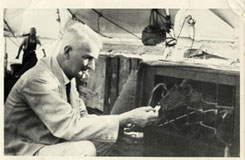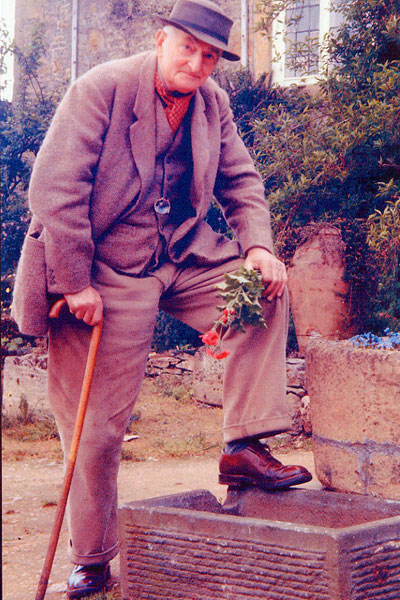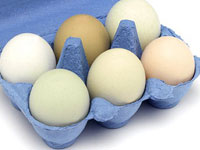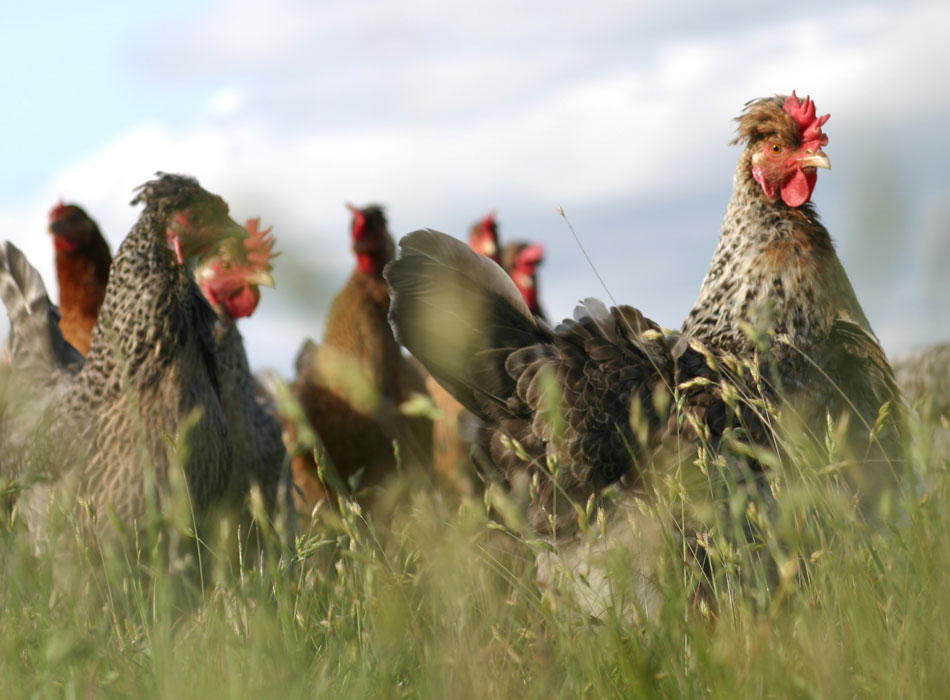
Clarence Elliott
The origins of the Old Cotswold Legbar, go back more than ninety years, when botanist and explorer, Clarence Elliott, returned from an expedition to Patagonia in 1927 with three blue egg laying Chilean chickens, or Araucanas.
The fourth bird was a cock, who met with an unfortunate end during the voyage, at the hands of the ship’s cook, who spoke little English. The cook misunderstood Elliott’s instructions to, ‘give the cock some supper‘ because it was making a terrible noise during a violent storm. The hapless bird became supper himself!
Elliott’s grandson Martin supplied Philip Lee-Woolf with many more fascinating details about this extraordinary man, and kindly allowed him to use the photos on this page.


Prof. Reginald Punnett
Elliott gave the three hens to a friend at Cambridge, Prof. Reginald Punnett, who was director of the University breeding programme. The professor was assisted by Michael Pease, whose aim was to improve the quality of livestock, available to British farmers, in order to increase their profitability. A separate poultry unit was set up in 1930, headed by Pease, and one of the by-products of Punnett’s experiments, in producing auto-sexing poultry, was the Cream, or Crested Legbar, which carried the genes from Elliott’s three hens, and laid blue/green eggs. Punnett introduced these Crested Cream Legbars to the world at the London Dairy Show in 1947.
An undergraduate at Cambridge, at the time of Punnett’s poultry experiments called John Croome, carried on breeding the Cream Legbars following the dispersal of the Cambridge breeding facility in the early 50’s, until his death in 1988. Fortunately, the Cream Legbars were saved from extinction because Croome had given some hatching eggs to David Applegarth, in Yorkshire, the year before his death, and David continued to keep Creams until recently.
Clarence Court
In 1989, Philip and wife Janet, formed the Clarence Court egg business, at Millhampost Farm, Winchcombe. The business name was coined from the Queen Mother’s home, Clarence House, because rumour had it, that the Queen Mother enjoyed a blue egg for breakfast. Their stunning new eggs were to bring a touch of elegance and refinement to what had become a boring utility product.
Philip was asked by Fortnum & Mason to supply the famous London grocer with eau-de-nil coloured eggs, which would be a perfect match for the store’s elegant décor.
David Applegarth
So he obtained some hatching eggs from David Applegarth, and proceeded to breed a flock of a several hundred Cream Legbars, which, for a while did the job, but they weren’t the best winter layers, and hadn’t the stamina for reliable commercial egg laying. A few years passed, and a move to Broadway, where he proceeded to introduce other bloodlines to Punnetts Cream Legbar, and the Old Cotswold Legbar was born. She soon took centre stage, producing elegant pastel shades of blue, eau-de-nil, celadon, and pink, under the Clarence Court label.
Cotswold Roots
In those days, coloured eggs were something of a mystery, so it’s no wonder that this little hen from the Cotswolds, took the market by storm. The word spread, and within a short time, the multiples were demanding to get in on the act, and the eggs went nationwide, bringing a welcome flare and colour to supermarket shelves across the UK.
Clarence Court eggs were, and still are, the preferred choice for many of London’s blue chip stores, and favoured by our favourite chefs, including Jamie Oliver, Rick Stein, Mark Hicks, & Tom Parker-Bowles, to mention a few. It was like a breath of fresh air. The market embracing innovation which had been lacking for years.
‘Mighty oaks from little acorns grow’
From humble beginnings, the blue egg layer from the Cotswolds, has made phenomenal progress, and has led a major change in the public perception of eggs, from the boring, cheap, offerings, in a grey pulp packs, all competing for the lowest price, with animal welfare well down on the list, to a trendy, colourful, and nutritious food.
The past 30 years have been a long journey, with ups and downs on the way, but one thing is for sure – blue eggs are here to stay.
Fifteen years ago, Janet and Philip sadly parted with the Clarence Court egg business, to allow them to concentrate their efforts on breeding and improving their beautiful Cotswold Legbar, and Burford Brown chickens, under the ‘Legbars of Broadway’ brand.
Legbars of Broadway
Thanks to Legbars of Broadway, anyone can enjoy the pleasure of owning some elegant Cotswold Legbars. They bring life and beauty to gardens, and have taken up residence in some of the finest country homes and estates across the UK.
Happy-go-lucky and fun loving, the Cotswold Legbar chicken has attracted love and affection for many years, and her fame has done much to raise awareness, and interest in blue eggs and traditional utility breeds of hens. She is an active, sprightly and inquisitive bird, weighing around 2-2.5kg, and provides a lively and interesting attraction to any garden, making a wonderful, easy-to-keep pet. She will produce up to 220-230 strong shelled eggs in the first year, and will carry on laying for many years, if kept in good free-range conditions, with some reported to still be laying a few eggs in their eighth year.
The Cotswold Legbar is not suitable for keeping in a small run and if free-ranging isn’t an option, the run space should be a minimum of 10 square metres per hen, which is the legal requirement for commercial organic hens
She has a long back and well-developed 40º tail, with an alert stance and sharp eye. Tough and resilient they are a bird for all seasons, able to thrive in most situations. However, they enjoy the company of their own kind & can be timid in the company of other more dominant breeds.
Please note – we continually work hard to improve the quality of our breeding stock, in order to produce strong, vigorous pullets, which we are happy to guarantee. For this reason, and to protect the ‘trade marks’, we do not sell cockerels or hatching eggs.
Delivery available to some areas, using our specialist bird courier
The Cotswold Legbar is only available through this website.
Beware of inferior look-a-likes from unscrupulous traders (birds or hatching eggs) of inferior quality !
- £5 off 4-9 birds
- £10 off 10-20 birds
- £20 off 21-50 birds
- £5 off 6-9 birds
- £5 off 4-9 birds
- £10 off 10-20 birds
- £20 off 21-50 birds
The Egg
There is no doubt that the stunning pastel coloured, thick shells, the deep yellow yolk, dense white, and wonderful flavour, make the Cotswold Legbar eggs very special. She is a prolific layer, producing up to 240 eggs in the first year, and up to 430 over three years. In a good free range situation, many Cotswold Legbars have lived for up to eight years.

Availability
We are no longer taking bookings for CotswoldLegbars in 2024
- £5 off 4-9 birds
- £10 off 10-20 birds
- £20 off 21-50 birds
- £5 off 6-9 birds
- £5 off 4-9 birds
- £10 off 10-20 birds
- £20 off 21-50 birds

